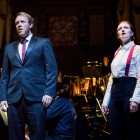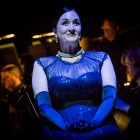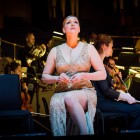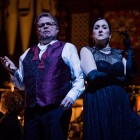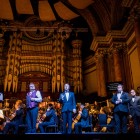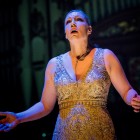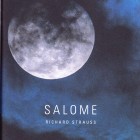Salome 2018Opera North
Read more about the opera Salome
We are becoming accustomed to Opera North extending their touring to the north of Newcastle, at least as far as Edinburgh. However they have only reached beyond the central belt once before, spending a week in Aberdeen in 2006. How refreshing then to encounter them giving a single Sunday matinee concert performance in the Perth Concert Hall. A Strauss opera has only been given on Tayside once before, when English Touring Opera presented Ariadne auf Naxos at the 2003 Perth Festival. Adventurous opera planning appears recently to have deserted the Festival, sadly, but here we have a single Scottish appearance of Salome during a tour that otherwise sticks to the company's home region.
Highly effective concert performances have recently been presented in Leeds and elsewhere of the Ring Cycle and Turandot. Eight performances of Salome were given altogether - three at Opera North's Leeds base followed by stops at concert halls in Perth, Coventry, Gateshead, Liverpool and Hull. It is to be hoped that this is the fore-runner of more such events. With this in mind, perhaps it should be noted by both Opera North and the concert hall management that this Sunday afternoon had an unfortunate clash, as Scottish Opera were simultaneously giving their only matinee of the new Eugene Onegin in Glasgow. Apart from those Glaswegians themselves, keen to hear a rarity, a significant element of the potential audience for Salome based in Dundee and Stirling, as well as Perth and the surrounding rural hinterland, will also have been previously committed to travelling to Glasgow long before news of the Perth event broke. Inevitably the audience assembled in Perth was smaller than hoped - fewer than 500 - which was a great pity. They did at least greet the performers with huge, and deserved, enthusiasm.
The cast was highly accomplished. Sir Richard Armstrong conducted two runs of this dramatic masterpiece during his years at Scottish Opera, but that was a long time ago. Here he conducted with a wonderful sense of dramatic thrust, while also bringing out much beautiful instrumental detail. If there was a fault, it perhaps lay in a lack of very quiet playing to give the ears some respite. This hall has generally been a great success, but when really large forces are assembled the onslaught of sound can be wearing, in a way that probably didn't apply earlier in Leeds Town Hall. Billed as a concert performance, this was successfully semi-staged by P J Harris, the narrow space across the front of the stage being used as a perfectly adequate acting area by the artists. Jamie Hudson's lighting added to the success with appropriate mood changes - the suicide of Narraboth or the departure of the contemptuous Jokanaan - made vivid.
The prominent bass-baritone Robert Hayward appeared in the last Scottish Opera run, in 2000, but his powers are undiminished - if anything his voice is firmer and more trenchant now than it was then. Katarina Karnéus is a past winner of Cardiff Singer of the World with an illustrious career behind her, but is scarcely known in Scotland. Her voice has now developed a dramatic style of projection and she made a highly effective appearance. Other principals are equally unfamiliar here. The tenor Arnold Bezuyen was unusually effective as Herod for the simple reason that he sang the part beautifully - far too often Herod is assigned to elderly tenors who bark or whine. Bezuyen revealed just how lyrically expressive the part can be,
The title role is, inevitably, the one who has to dominate any performance of Salome. In recent decades there has been a trend to cast lighter-voiced sopranos in the part, if they look suitably girlish. It was a relief to hear in Jennifer Holloway a full-voiced dramatic soprano. The voice was tirelessly produced, soaring above the orchestral tumult while still maintaining a fundamental sweetness of tone. Vividly acted, this was an excellent performance.
Oliver Johnston and Heather Lowe got the afternoon off to a splendid start, with the instant depiction of sympathetic and clearly-projected characters. There are several other roles - Jews, Nazarenes, Cappadocian, and so on, who were all differentiated surprisingly well in the semi-concert format. The communication of the whole performance was much helped by the unusually clear and well-timed supertitle projections. Salome has a very wordy text and given that most of the audience were unfamiliar with it, their instant comprehension was of vital importance.
Performance Cast
- Narraboth a young Syrian, Captain of the Guard
- Page to Herodias
- First Soldier
- Second Soldier
- Jokanaan John the Baptist
- Cappadocian
- Salome daughter of Herodias
- Slave to Herodias
- Herod Antipas Tetrarch of Judaea
- Herodias wife of Herod
- First Jew
- Second Jew
- Third Jew
- Fourth Jew
- Fifth Jew
- First Nazarene
- Second Nazarene

